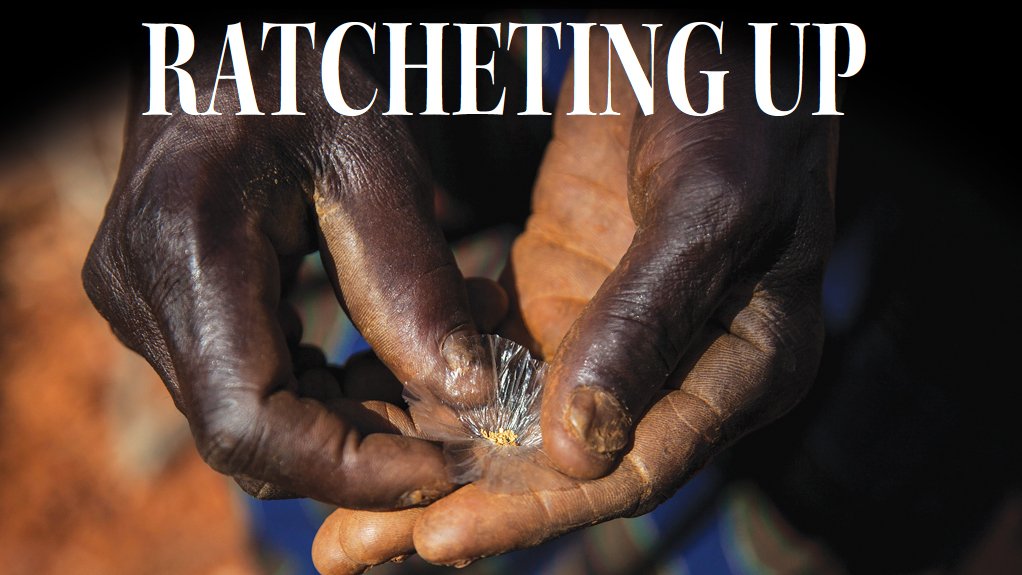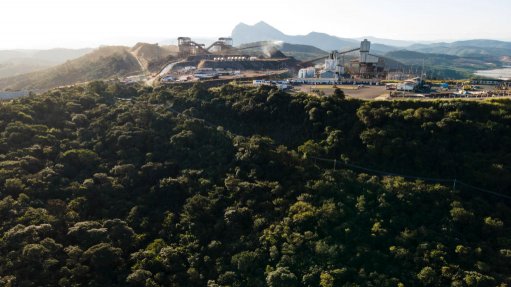Proposed European law to intensify war against conflict minerals
JOHANNESBURG (miningweekly.com) – If implemented, the proposed European Union (EU) conflict minerals legislation will help make responsible sourcing a natural part of doing business in areas struggling with conflict or instability, nongovernmental organisation Global Witness conflict minerals campaigner Emily Norton says.
The trade in tin, tungsten, tantulum and gold (3TG), she notes, has funded conflict in the Democratic Republic of Congo (DRC), especially in the North Kivu area, for decades through illegal and unregulated mining practices.
Revenues from the extraction and sale of these natural resources, also known as conflict minerals, not only provide armed groups with the means to operate but also provide State security forces and corrupt officials with off-budget funding.
Conflict-mineral legislation, specifically Section 1502 of the Dodd Frank Act, promulgated in the US in 2011, was the first legislation of its kind that aimed to break the links between the lucrative minerals trade in certain African regions and armed groups.
However, members of the European Parliament last month voted in favour of a new strong and binding law to deal with the trade in conflict minerals.
This vote determines the European Parliament’s (EP’s) position when it enters into negotiations with member States to find agreement on the law, although the law adopted by the EP is still in draft form and member States still need to review the proposal from the EP and respond. The EP, the European Council and the European Commission will then negotiate a final version.
This legislation could put Europe at the helm of global efforts to clean up the minerals trade and encourage businesses to source minerals in a way that benefits local communities, she points out.
“The EP has sent a clear signal that European firms cannot turn a blind eye to the risk that their operations contribute to human rights abuses abroad,” says Norton.
The proposed law will require European companies importing 3TG to source the minerals responsibly by taking steps to minimise the risk that their purchases contribute to conflict or human rights abuses in other countries. The new law will also, for the first time, require companies to act responsibly when importing products such as laptops and mobile phones.
“The EP’s proposal expects companies to source responsibly by identifying, managing and reporting on specific risks in their supply chain, in line with international standards,” Norton says.
She notes that due diligence guidance published by the Organisation for Economic Cooperation and Development is the internationally recognised standard available to help companies meet their due diligence reporting requirements, adding that responsible sourcing is not a trade restriction or a trade embargo.
“[The standard] helps companies to source from higher-risk environments, provided they increase their due diligence accordingly. Disengaging entirely from regions or countries is neither responsible nor a requirement,” she points out.
Norton adds that the EP has made it clear that responsible sourcing is the responsibility of the entire supply chain and that due diligence is most effective when it involves companies throughout the chain, as it enables them to share information, develop industry schemes and other best practices and collectively influence suppliers inside and outside the EU.
She also notes that due diligence levels the playing field and makes it easier for companies to comply with responsible sourcing requests from customers.
“Critically, the EP has acknowledged that companies at different points in the supply chain have different roles to play in this process. It also makes it clear that the standards expected of a company will depend on its individual circumstances, such as size and activities – responsible sourcing is not a one-size-fits-all approach,” she adds.
If European member States match the EP’s commitment to responsible sourcing, the EU law that is to be finalised could help make the responsible sourcing of these minerals the norm, rather than the exception.
EU and US Regulations
Law firm ENSAfrica mining and environmental law director Lloyd Christie tells Mining Weekly that, although the draft EU law and Section 1502 of the Dodd Frank Act have similar aims, they do differ in some respects.
The Dodd Frank Act, he notes, is regional and focuses on the DRC and nine adjoining countries, whereas the draft EU law applies to any conflict-affected or high-risk area.
Another difference is the categories of companies required to conduct due diligence and disclose their activities. The EP’s proposal will cover companies intending to participate in the EU market, irrespective of the quantity and importance of the mineral used in the production of end-user goods, he says, noting that the Dodd Frank Act applies only to US-listed companies.
In addition, he points out that the EP’s proposal provides a framework for downstream companies, such as mobile phone manufacturers, to conduct compulsory supply chain due diligence activities.
He notes that South African mining companies operating in the DRC need to align themselves with the obligations imposed on importers to avoid an interruption in supply and export, highlighting that mining companies operating legitimately should not be concerned.
“The EP’s draft law would only directly affect South African companies if they are also established in the EU and import the target minerals into the EU market or act as an agent to do so.”
Christie adds that this does not mean that the conflict mineral regulation cannot indirectly affect South African companies that participate in the value chain that gets the target minerals from the conflict-affected or high-risk areas to the EU market.
“This can happen by way of an EU buyer requiring more transparency,” he says.
Christie emphasises that South Africa- based importers would not have to comply with the EP’s proposal, as it only applies to EU importers and downstream companies placing products on the European market.
Mineral Traceability
Nongovernmental organisation Pact supports the governments of the Great Lakes region of Africa by implementing the field activities of the ITRI Tin Supply Chain Initiative (iTSCi), a joint industry mechanism aimed at addressing conflict-mineral concerns in the Great Lakes region.
Without this system in place, which covers mines in the Katanga, Maniema, South Kivu and North Kivu provinces in the DRC, tens of thousands of artisanal miners would find it difficult to sell tin, tantalum and tungsten (3T) on the international market.
“Working in partnership with governments, corporations, miners, mineral traders, international stakeholders and local communities, Pact helps to ensure that mines and mineral trading routes are free from conflict and are not connected to human rights abuses. The model for the project is that it is implemented by government, funded by users and monitored by civil society,” says Pact country director for the DRC, Rwanda and Burundi and iTSCi programme manager Yves Bawa.
He adds that Pact also supports governments in the formalisation of the mining sector, including training staff, providing technical assistance, distributing project materials and collecting data for transfer into the international system for traceability.
“To help these governments comply with regulations, such as the new draft legislation that was recently passed by the EP, we also facilitate the creation of multistakeholder committees to monitor mines and roads, and use mitigation measures in case of problems,” he says.
Additionally, Pact provides guidance and evidence for international bodies on the realities of the mining sector in the Great Lakes region of Africa.
More than 35 000 mineworkers in the DRC are back at work at iTSCi-approved mines and have access to markets for 3T minerals, with safer working conditions and improved livelihoods.
“For individual miners, the iTSCi programme has meant that they now work free of threat from armed groups, supported by a system that reports and investigates any allegations of human rights abuses. Without iTSCi, these mineworkers would be out of work or at the mercy of the black market again,” Bawa notes.
He emphasises that mineral traceability and due diligence are neither a panacea for ending conflict in the region, nor does it claim to do so. The underlying causes of conflict in the region are complex and simply shutting off one source of financing for this conflict will not solve all the root problems.
“However, it can provide safer, more secure livelihoods for tens of thousands of individuals and their families and support the health of economies and communities,” Bawa concludes.
Comments
Press Office
Announcements
What's On
Subscribe to improve your user experience...
Option 1 (equivalent of R125 a month):
Receive a weekly copy of Creamer Media's Engineering News & Mining Weekly magazine
(print copy for those in South Africa and e-magazine for those outside of South Africa)
Receive daily email newsletters
Access to full search results
Access archive of magazine back copies
Access to Projects in Progress
Access to ONE Research Report of your choice in PDF format
Option 2 (equivalent of R375 a month):
All benefits from Option 1
PLUS
Access to Creamer Media's Research Channel Africa for ALL Research Reports, in PDF format, on various industrial and mining sectors
including Electricity; Water; Energy Transition; Hydrogen; Roads, Rail and Ports; Coal; Gold; Platinum; Battery Metals; etc.
Already a subscriber?
Forgotten your password?
Receive weekly copy of Creamer Media's Engineering News & Mining Weekly magazine (print copy for those in South Africa and e-magazine for those outside of South Africa)
➕
Recieve daily email newsletters
➕
Access to full search results
➕
Access archive of magazine back copies
➕
Access to Projects in Progress
➕
Access to ONE Research Report of your choice in PDF format
RESEARCH CHANNEL AFRICA
R4500 (equivalent of R375 a month)
SUBSCRIBEAll benefits from Option 1
➕
Access to Creamer Media's Research Channel Africa for ALL Research Reports on various industrial and mining sectors, in PDF format, including on:
Electricity
➕
Water
➕
Energy Transition
➕
Hydrogen
➕
Roads, Rail and Ports
➕
Coal
➕
Gold
➕
Platinum
➕
Battery Metals
➕
etc.
Receive all benefits from Option 1 or Option 2 delivered to numerous people at your company
➕
Multiple User names and Passwords for simultaneous log-ins
➕
Intranet integration access to all in your organisation





















